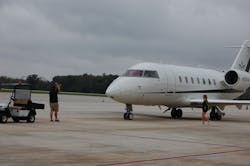An External Resource for Handling Large Events
When a city hosts large-scale events – the Super Bowl, the Final Four, golf tournaments, music festivals, etc. – an influx of business aviation travel can often be expected. With additional traffic drawn to specific locations, it can mean big business for FBOs.
But if a smaller, independent FBO is not properly prepared to handle an event or views the situation as too much work without enough payoff, revenue can be left on the table.
What’s worse, if the correct amount of effort isn’t put forth by the FBO, it can have a negative effect on the customer and potentially reflect poorly on the FBO, the host city or the event itself.
With first-hand experience organizing event traffic, managing partners Brian Bourbeau and Jenn Swenson established Jet Event Technologies (JET) to help guide FBOs through the process.
“We want to provide support and logistics for FBOs that struggle with doing this in the industry. Events is a tough area to handle for small, independent FBOs,” says Bourbeau, who established JET with Swenson in September 2020. “Our goal is to increase the level of service and make it an efficient operation.”
JET’s first contract was with Burrows Aviation in Sheboygan, Wis., to provide ground operations ahead of and during the Ryder Cup at Whistling Straits Golf Course. The company has signed on to assist Augusta Regional with The Masters golf tournament and is now bidding to work upcoming events, including the Super Bowl and others such as NASCAR events and additional PGA golf tournaments.
“There’s a vast opportunity with FBOs,” Swenson says, noting that while large FBOs have a corporate structure and culture, smaller locations may need additional assistance.
“There’s a lot of pen-to-paper, and there’s a lot of old-school approaches,” she adds.
In cities where FBOs may not have much competition, Swenson says asking simple questions about structures, processing fees, fuel options, etc., can help stations address important needs prior to an event.
“That’s where we have expertise beyond just running large-scale events,” Swenson says.
Experience with Events
Bourbeau has traveled to work with other crews at events. Through Avfuel’s network, he took on work at Augusta Regional Airport when the location was seeking extra line staff for The Masters golf tournament.
“I signed up,” Bourbeau says, of his first event. “The way I looked at it, it was a chance to see another operation. Anytime I’ve traveled, I’ve always wanted to see how things are ran to see what I can bring back to my team. That was my first goal.”
Bourbeau returned to Augusta in subsequent years and frequently discussed event operations with Kenneth Hinkle, Augusta’s airport director.
Bourbeau, who previously worked with Premier Jet Center at Flying Cloud Airport (KFCM) in Minnesota, created a playbook and developed his expertise with events by overseeing operations around the 2016 Ryder Cup, the 2018 Super Bowl and the 2019 NCAA Basketball Final Four – all held in the Minneapolis area.
Bourbeau says the key is to increase profits for the FBO so that money can be reinvested in improving operations.
Swenson and Bourbeau are the only full-time employees at JET, so relying on contracted line service technicians and customer service representatives (CSRs) is critical. Through connections made as a contracted line tech at events, himself, Bourbeau has established a reliable network of personnel to help JET run events.
“Our job is to come in and say, ‘We’re going to provide 10 line techs or 10 CSRs.’ That’s the product we’re delivering,” Bourbeau says.
“These are guys we’ve vetted,” he continues. “I know exactly how they work. They know me. They can come into any airport, and they can work an event.”
“When you start to align yourself with professional FBO operators, ground personnel or whatever it is, there is that professional line. With their quality and experience, they can be plugged in anywhere,” Swenson adds. “But you need to get with the right professional crew.”
It’s imperative, explains Bourbeau that contracted personnel run safe operations and move aircraft carefully because of the negative impact and associated costs incurred by ground damage.
“If we have one incident, it ruins the whole week,” he says.
“A lot of times, people start cutting corners because they feel like they’re getting behind and they feel pressure,” Bourbeau continues. “The human factors start playing into it. We want to try to limit those and say, ‘No matter how busy you get, this is the process, and this is how we’re going to do it.’”
JET works hand-in-hand with an FBO owner to evaluate how local line techs operate and identify their in-house standard safety practices to determine if any additional safety procedures are required to run the event.
In addition to operating safely, customer service is a key focus as well. Swenson notes that JET can assist with this by communicating directly with passengers, pilots and the airport commission on behalf of an FBO.
“How can we be the liaison for different people and what does that scope of work look like?” Swenson says. “We can make safe, efficient decisions that are customer focused. Being able to blend those two are super important.”
To ensure customer-facing responsibilities are handled correctly, Swenson focuses on point-of-sale and concierge software, which she says can look radically different from one FBO to another – and at times can be outdated.
“Brian and the guys need to know what flights are coming in, where are we at and what services are needed. So, a binder with a piece of paper isn’t going to be sufficient,” Swenson says.
What’s more, providing an FBO with the appropriate software is an opportunity to cross-reference from an invoicing perspective to ensure paperwork is organized correctly.
“Ultimately, we can have a great experience and keep them safe. But when you screw up their invoice, people aren’t happy,” says Swenson, who also oversees flight tracking and additional communication responsibilities.
Different Dynamics
Every event varies in terms of when arrivals and departures are expected.
“Final Four events – those are lot more small- and mid-size cabin aircraft,” Bourbeau says. “Super Bowl is the who’s who of the United States, so every big, A-list celebrity is flying in on the biggest jet possible. So, it’s a lot of large-cabin aircraft.
“When we look at events, we look at that event in the previous cities and we’re breaking it down and saying this is the percentage of small-cabin, this is the percentage of mid-size,” he continues. “So, when we’re looking at an airport and we’re planning the ramp, do we need to plan for 70 percent Gulfstreams, or do we need to plan for 70 percent King Airs and Citations? Because that’s going to change your footprint and your dynamic of how you can park things.”
And even with best laid plans, the ability to adjust is paramount.
“If it’s something where people are waiting to see who’s playing – like the Super Bowl – nobody is going to call you and make a reservation,” Swenson says. “A lot of people aren’t 100 percent sure they’re going until they know who the teams are. It can be a lot more last-minute with that.”
While changes are to be expected, Swenson still emphasizes the importance of preparing in advance, whenever possible.
“I want our customers, before they come in, to feel like they know what’s going on,” she says. “You can get bogged down when you have two CSRs that are trying to run a regular ramp operation and deal with all the incoming calls, traffic and changes.”
Wearing Many Hats
Much work is required before, during and after an event.
“The two of us work a lot on getting everything staged and set up – all of our staff hotels, transportation, rental cars, logistics for that. Jenn is focused on creating relationships with catering companies, rental car companies, transportation companies – all the companies are going to support us,” Bourbeau says.
Bourbeau’s prep work centers around ground support equipment (GSE) and staffing needs.
“When we’re planning equipment, we start with figuring out our staffing level. Once we have our staffing level, then I figure out with how much staff I have, how many flights an hour can I work?” Bourbeau says.
“My work then becomes the week of the event,” he continues. “Running the ramp and getting as many aircraft on the ground and on the pavement as safe as possible, that’s where I become busy on my side of the planning.”
The event itself is a fast-paced, busy period of time, requiring JET’s team to move from task to task to ensure safety and customer service requirements are met.
“It’s a constant juggle of making sure you’re triaging where the attention is needed,” Bourbeau says.
Added Assistance
While an event can consume the full attention of JET’s team, without the additional resources they provide, it could be overwhelming for an underprepared FBO.
“The more vendors we talk to, the more FBOs we talk to, they have no idea this type of business even exists,” Swenson says. “So, we wanted to have a product vast enough so we can cast a wide net and see where people need support. We bring really different areas of expertise to it, so we kind of navigate into different FBOs and say, ‘we can help you solve this problem, not just events.’
“We really like events because it is an area that people just fundamentally have no idea how to run. If you have one event every four years, why or how would anyone know how to do that?” she notes.
“There’s a lot that goes into it.”
About the Author
Josh Smith
Editor
Josh Smith served as editor of Ground Support Worldwide as editor from 2016 through 2024. He oversaw production of the print magazine, created GSW's newsletters on a daily basis, and updated the latest news on AviationPros.com.

